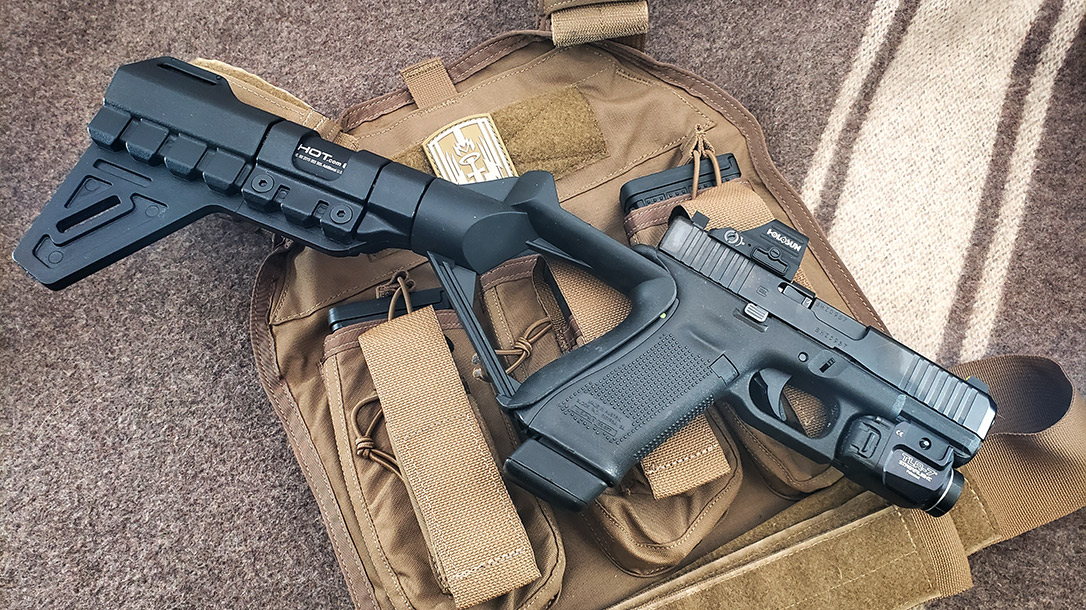The judge granted the plaintiffs’ motion for summary judgment and ordered the rule vacated.

A federal judge in Texas has overturned a rule issued by the Bureau of Alcohol Tobacco, Firearms and Explosives (ATF) that targeted pistol attachments known as “stabilizing braces” or “pistol braces” and treated pistols fitted with such devices as short-barreled rifles, subjecting them to various restrictions.
In a 12-page decision issued on June 13, U.S. District Judge Reed O’Connor ruled that the ATF’s rule that treated roughly 99 percent of pistols fitted with the braces as short-barreled rifles violated the Administrative Procedures Act’s procedural requirements because it was not a “logical outgrowth” of the proposed version of the rule.
“The Court finds that the adaptation of the Final Rule was arbitrary and capricious for two reasons,” Judge O’Connor wrote. “First, the Defendants did not provide a detailed justification for their reversal of the agency’s longstanding position. And second, the Final Rule’s standards are impermissibly vague.”
The judge granted the plaintiffs’ motion for summary judgment and ordered the rule vacated. The plaintiffs in this case are two individual members of the Firearms Policy Coalition (FPC), Maxim Defense, and FPC.
FPC President Brandon Combs said the ATF had “lawlessly acted to turn millions of gun owners into felons.”
“FPC members should be proud of what was accomplished today. We look forward to defending this victory on appeal and up to the Supreme Court, just as we have in other cases,” Mr. Combs said in a statement.
He said he expects the defendants, which include the ATF and the Department of Justice (DOJ), to appeal.
The Epoch Times has reached out to the ATF and DOJ with requests for comment on the ruling and whether they intend to appeal.
Background
The pistol stabilizing brace was invented more than a decade ago to assist the disabled and others who may need help shooting large-format pistols built on the AR-15 and similar platforms. The accessory attaches to the rear of the pistol and the shooter’s forearm, enabling a steadier aim while holding the firearm with one hand.
Restrictions on stabilizing braces have been the subject of intense debate after the ATF proposed them in 2020. Initially, the ATF said in several open letters that it did not consider the braces as converting pistols into short-barreled rifles but in the final rule, the agency cited changes in the braces’ design in saying they convert pistols into restricted short-barreled rifles.
In January 2023, the DOJ announced that it had submitted the final rule to the Federal Register, formalizing the regulation that President Joe Biden advocated for in April 2020 after it was found that a man killed 10 people at a grocery store in Boulder, Colorado, using a gun with a stabilizing brace.
The rule has faced pushback from Republicans and gun-rights groups like the National Rifle Association, which pointed out they were originally designed for disabled veterans. The rule was also the subject of litigation that led to a preliminary injunction in April 2024—and eventually led to the June 13 ruling that vacates the rule and sets up a possible U.S. Supreme Court appeal.
The rule went into effect immediately upon publication. Any firearms with stabilizing braces or similar attachments that qualified them under the new rule as short-barreled rifles had to be registered no later than within 120 days, or modified by removing the brace and restored into a regular pistol, or turned into a local ATF office, or destroyed.
Short-barreled rifles are subject to more strict regulations under the National Firearms Act (NFA), with those found in possession of unregistered NFA firearms can face fines of up to $10,000, ten years in prison, and a felony conviction that would disqualify them from future firearm ownership.
Tim Harmsen, an Indiana-based firearms dealer, told The Epoch Times in an earlier interview that, in his view, the ATF’s stabilizing brace rule was part of a broader strategy of gun control “by a thousand cuts.”
On the campaign trail and since taking office, President Biden has pledged to get tougher on guns, citing the need to curb gun-related violence.
President Biden has publicly said he would back measures that ban magazines that carry 10 rounds or more—which are common and are owned by millions of Americans—and so-called assault weapons.
The number of Americans impacted by the ATF’s brace rule is difficult to determine. The ATF estimates that 3 million pistol braces have been sold. Second Amendment advocates say the number is closer to 40 million.
Michael Clements and Jack Phillips contributed to this report.